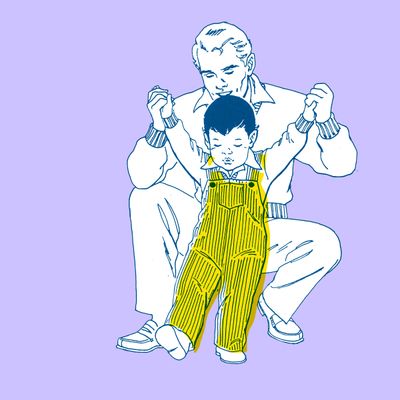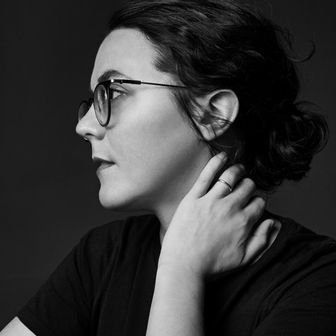
“In California,” Tag was insisting, “the beaches are freer. You can bring dogs on the beach! I just don’t understand why New York beaches are so regulated.”
There’s nothing remarkable about my husband’s statement. In our family’s experience, it’s simply true — you’ll get stopped by the police for walking a dog at Jacob Riis, even one that’s leashed. At Ocean Beach in San Francisco, the dogs run free.
What stood out to me, as we meandered down the sidewalk with our 2-year-old, was how Tag spoke about this topic — California beaches = good, New York beaches = inferior — in a way that took nothing about his audience into account. As his wife, I can tell you this is not the first time Tag has discussed beach quality, nor is it the second or the third or even the fourth. “I don’t disagree with you in any way,” I said gently. “This is something we’ve talked about quite a bit.”
He acknowledged I was right. But he did so in a murmur, with a far-off look in his eyes, in a way that I knew meant he was still thinking about it, how citizens and their dogs deserve unfettered access to our planet’s bodies of water. Tag’s passion for beaches is a strong one. He feels similarly about riding bikes, baking bread, the merits of moping, and California in general, all topics he is prone to unabashedly discussing at length. He is also a father. In other words, my husband is a Weird Dad.
Stubborn interests are part of what makes a dad a weird one, though the actual nature of these interests is unimportant. One Weird Dad I know is an urban-dwelling lawyer with a passion for men’s westernwear. Another spent three figures buying football memorabilia for his 3-year-old daughter. Specifics do not define a Weird Dad. The intensity of his individual interests does.
Adjacent to his particular passions and hobbies and convictions, the Weird Dad is also a twinkly-eyed stickler. Though he intends no harm, he is often overcome with a conviction for correctness. It’s just that he knows there’s a right way to do something, and he hates to think about what might happen if you continue doing it the wrong way. Here, hand it over. Let him show you.
In my family, we enjoy a game called Next Car, which is what you’d probably expect — participants predict the color of the car that will drive down the street next. Our son is currently into orange, and his parents react differently when his guess reflects this. His father asks if he’s sure, if he really thinks the next car driving down the street will be such an unusual one. His mother holds her tongue, on the tip of which rests a few thoughts about stifling creativity for the sake of reality.
But reality weighs heavy on the mind of a Weird Dad. Because for him, mortality has become a driving force. He has a child now, which has made him so grateful for the life he enjoys and so conscious that one day, he will no longer be alive to enjoy anything. One day, he will be dead. Another day, his child will also be dead. For reasons not readily apparent, grappling with his own cosmic insignificance makes a Weird Dad more invested in seemingly trivial matters, not less.
(If you’re wondering why mortal reckoning affects dads in particular, I have one word for you: reproduction. Trying to get pregnant and giving birth are both very thorough lessons in your own unimportance.)
Looking back, all signs point to the love of my life being destined for Weird Dadness. When I met him ten years ago, Tag worked as a book designer and lived in a room with a view of the freeway. His main hobby was using his BlackBerry to take photos of strangers and carefully typing out accompanying captions, then posting them to his blog. Like a cartoon, he owned exactly one pair of brown shoes, refusing to buy another until the current pair fell apart. His ex-girlfriend had helped him make his duvet cover, which featured a giant drawing he’d done of his own face.
I feel a bit wistful sometimes, for how little time my husband now has for his weird passions and beloved hobbies — that he went from the breezy freedom of a Weird Guy to the more confined life of a Weird Dad. But that’s not to say there’s nothing exciting about having bred a witness, someone with a front-row seat to the person and parent my husband has become. I love the idea of my son, years and years older, telling his friends in a begrudging, bewildered tone about all the times his father made him memorize a map or reload the dishwasher a specific way or listen to another soliloquy about how it’s almost sort of embarrassing, how much a person can love California.
There’s something about having less time for your own weird self that spills into being a parent, I think, and means you end up infusing whatever convictions you have left straight into parenting. Sometimes this means subjecting your family to a well-worn topic of conversation, sometimes it comes out in the insistence that bowls should be placed facing in, never out. But I believe it’s all done somewhat knowingly, that Weird Dads realize, in between their impassioned speeches and persistent oddities, that you can’t control anything when you love a mortal being so fiercely. However much it’s a punch line we’ve all heard before, being a Weird Dad is also the smallest, loveliest attempt at power, in the face of having absolutely none.





